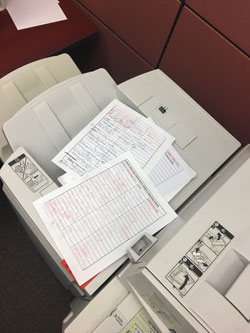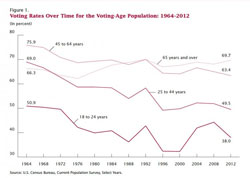According to FiveThrirtyEight, an independent election poll analysis site, Monmouth University’s Polling Institute was ranked as the fifth best in the country out of 539 organizations.
Patrick Murray, Director of the Polling Institute, said, “We try to merge the best of academic survey research and campaign-style polling. I think that has played a role in our track record over time.”
One of the main goals of the polling institute is to ensure that the public voice is heard and to analyze the public opinions on critical national and state issues. It is not a means of predicting the exact future, but getting an understanding of what the people are concerned with.
“One of the major misperceptions we try to counter is that polls are some sort of crystal ball. Public opinion polls are designed to measure the here and now among a known population. Election polls that use likely voter models to forecast a future event are moving a step beyond what where basic survey research methodology does best,” explained Murray.
He continued, “By comparing election polls to the stock market, it’s hard to predict what will happen to stocks in the next six months similar to how leading up to an election it can be hard to gauge where voters lie.”
“You have some metrics today that can get you close, but economists are frequently wrong about those predictions. They are more often to be right when things are stable. That means that as politics have become more volatile, the ability to model a future electorate, even a week or two before an election becomes that much harder even if the underlying base sample is representative of all possible voters,” he said.
Aaron Nitzberg a senior political science student, said, “I think polling in finding out what people believe can be useful, especially when analyzing current trends, ironically when using polling data to try to determine people’s beliefs beyond what the media represents, I think oftentimes that this is an inevitable gridlock. Most people’s interactions and engagements with politics exist through media which over time inversely changes their views to become the institutions’ views, ultimately their outlooks may have been manufactured for political ends. Twice as ironic, media proclaiming itself as being transparent can also be more enticing or entrapping, all media claims to be ‘transparent’ but I would argue that the political reality is otherwise.”
One of the most important aspects of a polling institute is that it is honest with its community, not trying to spin a narrative in its favor, but presenting the facts plain and simply. Especially in recent years where people have been distrustful of certain elections utilizing mail-in ballots.
“We know that polls, like many other sources of information, have become more distrusted over the past few years. One of the things we are proud of at Monmouth is our commitment to transparency in the methods we employ. It is gratifying that this is reflected in our transparency score in the 538 ratings. It should be no surprise that the most transparent polling organizations are academic institutions, and Monmouth has been at the vanguard of promoting greater transparency in the polling industry. We lead by example,” said Murray.
He continued, “We use our blog posts to try to improve the public’s understanding of opinion on different issues, particularly when they reveal shortcomings in leadership or when there are seemingly contradictory poll results on the same topic. We are not afraid to call out problems in polling because we are willing to take responsibility when we may not get things quite right. That’s part of our commitment to transparency.”
Stephen Chapman, Ph.D., Associate Professor of Political Science and Sociology, said, “Since coming to Monmouth in 2014, I’ve interacted with the polling institute on many occasions. I’ve been a part of some events with Patrick Murray as well as tapped into their resources for some of my own research. Even before coming to MU, the polling institute had a growing reputation for being a solid source of polling information.”
Melissa Alvare, Ph.D., Associate Professor of Political Science and Sociology, said, “ I know that Monmouth’s Polling Institute is reputable and that their results can help us gauge patterns in public opinion, providing solid data to bolster or challenge narratives circulating in mass media and social media.”
“We see Monmouth’s polling mission as a necessary corrective in an era of disinformation and misinformation. Our job is to set the record straight, not just about voters’ views, but on the general public’s attitudes and behaviors across a whole range of important topics,” Murray concluded.




